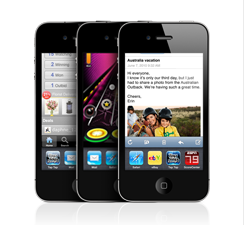Many people are holding on to the most popular smartphone - Apple iPhones. But not many are changing their default Apple Ringtones. It can be rather complex to the average people if you ask me. So I came up with a step-by-step guide on how to change your iPhone ringtone.
I understand from many of my friends who are the proud owners of iPhone and even the latest iPhone 4 are not aware that they can actually synchronize their phone with a computer system such as laptop, netbook or laptop. All they understand about iPhone is at its very primary level. just a phone.
Apple iPhone is not just a phone, it has became a part of many people's life. It is easy to use and cool to have. Almost where I turned, I sees people holding on or engrossing very much with their iPhones.
But the sad part about Apple iPhone is that changing of ringtone is not just an App away. It requires some technical knowledge on how to do it before you are able to give your favorite iPhone a touch of your musical taste and personality.
Here is a step-by-step guide on how you can actually change your ringtone for your iPhone to the latest hit songs like - Love you see you lie, Like a G6, Eenie Menie and so many more.
- 1
First, you need a PC or a computer system. Go on the web to look for free iPhone ringtone downloads. Well, free sites providing this may not be easy to find as most would require you to pay or subscribe as member. I have made a search and found one good site that provides free iPhone format (.m4r) ringtones. There are 100 over latest hit songs including Chinese hit songs to choose from. Introducing Audiko, one of my favorite site for free iPhone ringtone downloads.
- 2
After downloading your desired ringtone clips, you would probably be prompt to open this clip with a program. Choose iTune to open these clip and it will automatically be saved in your iTune library under 'ringtone' section.
- 3
Plug in the provided USB cable (The one you use for charging your iPhone) into the computer system such as laptop or desktop. It will automatically be detected that an iPhone has been connected. Click on your iPhone section to start synchronization.
- 4
Unless you want to spend a lot of time for your iPhone to be backed-up and synchronisation, you can just start the synchronisation immediately without doing anything. But you would like to save some time, you can unchecked the sync App, pictures and videos and only check the 'sync ringtone'.
>>Read on for the complete full step-by-step guide to change your iPhone ringtones
